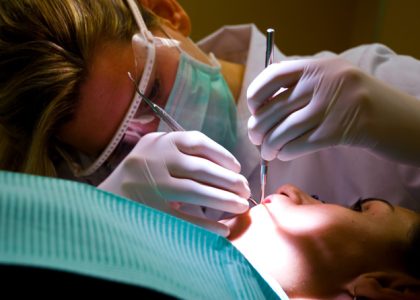When faced with a dental emergency, knowing how to act quickly can make all the difference. You might encounter situations like a knocked-out tooth or an unbearable toothache, and your response needs to be both calm and informed. It’s crucial to have essential supplies on hand and to understand the immediate steps to take in each scenario. But what happens if you’re unsure of how serious the situation really is? Let’s explore the key actions you can take to ensure the best outcome in these critical moments.
Common Dental Emergencies
When you face a dental emergency, it’s important to recognize the common issues that can crop up, so you can take action quickly.
One frequent problem is a knocked-out tooth. If this happens, you should find the tooth, hold it by the crown, and avoid touching the root. Rinse it gently with water and try to reinsert it into the socket if possible. If not, place it in milk or saline until you get to the dentist.
Another common emergency is a severe toothache. This could indicate an infection or decay. You’ll want to rinse your mouth with warm saltwater and avoid placing aspirin directly on the gums, as this can cause burns.
A cracked or broken tooth can also cause panic. Rinse your mouth with warm water, and if there’s bleeding, apply a clean cloth to the area. You should see your dentist as soon as possible to prevent further damage.
Lastly, dental abscesses, which are infections at the root of a tooth, can lead to swelling and pain. It’s crucial to seek immediate care to avoid complications.
Recognizing these issues can help you respond effectively until professional help is available.
Essential Supplies to Keep
Having the right supplies on hand can make a significant difference in managing dental emergencies effectively. Start by stocking a small dental emergency kit. This kit should include items like sterile gauze, which can help control bleeding, and a cold pack to reduce swelling. You’ll also want to have dental floss on hand to remove any stuck food particles.
Consider keeping a small container with a lid for any knocked-out teeth. It’s crucial to store the tooth properly to increase the chances of reattachment. Additionally, an over-the-counter pain reliever can provide temporary relief from discomfort until you can see a dentist.
Don’t forget to include antiseptic wipes or solution to clean any wounds, and a small mirror to inspect your mouth if needed. If you wear braces or other dental appliances, it’s wise to have orthodontic wax handy to cover any sharp edges that might cause irritation.
Lastly, keep an updated list of emergency contacts, including your dentist’s number and the nearest emergency dental clinic. By preparing these essential supplies in advance, you’ll feel more confident and ready to handle any dental emergency that arises.
Immediate Steps to Take
Take quick action to assess the situation and determine the severity of the dental emergency. Is it a knocked-out tooth, a broken tooth, or severe bleeding? Your immediate response can make a significant difference.
If you’ve lost a tooth, find it, hold it by the crown, and rinse it gently with water. If possible, try to reinsert it into the socket. If that’s not feasible, store it in a container with milk or saline to keep it moist.
For a broken tooth, rinse your mouth with warm water and apply a cold compress to reduce swelling. If you’re experiencing bleeding, apply gentle pressure with a clean cloth or gauze. It’s vital to keep calm and avoid using aspirin directly on the affected area, as it can worsen bleeding.
In case of a dental abscess, rinse your mouth with warm saltwater to help alleviate discomfort, but avoid popping the abscess yourself.
Remember to contact your dentist as soon as possible for further evaluation and treatment. Your prompt action can help mitigate pain and preserve your dental health, so don’t wait too long to seek professional help.
Managing Toothaches at Home
Toothaches can be incredibly uncomfortable, but there are effective home remedies you can try to alleviate the pain until you can see your dentist.
First, rinse your mouth with warm salt water to help reduce inflammation and cleanse the area. If you have a cold compress, apply it to the outside of your cheek for 15-20 minutes to numb the pain and lessen swelling.
Over-the-counter pain relievers like ibuprofen or acetaminophen can be effective in managing your discomfort. Just be sure to follow the dosage instructions on the label. If you have clove oil, it can serve as a natural anesthetic. Dab a small amount on a cotton ball and apply it directly to the affected area.
Avoid very hot or cold foods and drinks, as they can worsen the pain. Instead, stick to soft foods and stay hydrated. If you experience any swelling, consider elevating your head while you rest to minimize pressure in the affected area.
Handling Chipped or Broken Teeth
If you’ve chipped or broken a tooth, it’s important to remain calm and take immediate steps to protect the damaged area. First, rinse your mouth gently with warm water to clean the area. Avoid using hot or cold water, as it might cause discomfort. If there’s bleeding, apply gentle pressure with a clean cloth or gauze until it stops.
Next, assess the damage. If the chip is small, you mightn’t need urgent care, but you should still see a dentist as soon as possible to prevent further issues. For larger breaks or if you experience pain, seek dental help immediately.
To ease any pain, over-the-counter pain relievers can help, but avoid placing aspirin directly on the tooth or gums. If you have a piece of the tooth, save it in a container with milk or saliva to show your dentist.
While waiting for your appointment, refrain from chewing on that side of your mouth and stick to soft foods. Remember, timely intervention is crucial to preserve your tooth and maintain your oral health. Don’t hesitate to contact your dentist for guidance on the next steps.
What to Do for Knocked-Out Teeth
When a tooth gets knocked out, acting quickly can make a big difference in saving it.
First, locate the tooth and handle it by the crown, not the root. Rinse it gently under lukewarm water to remove any dirt, but don’t scrub or use soap. If possible, try to reinsert the tooth back into its socket. You can do this by gently pushing it in place while biting down on a clean piece of gauze or cloth to hold it steady.
If you can’t reinsert the tooth, place it in a container with milk or saline solution. These fluids help keep the tooth viable until you can get to a dentist. Avoid using water alone, as it can damage the root cells.
Time is crucial, so aim to see a dentist within 30 minutes if you can. In the meantime, you might want to take over-the-counter pain relief if you’re experiencing discomfort.
Remember to keep calm and keep the tooth moist. Taking these steps promptly can significantly increase the chances of saving your tooth and ensuring a successful dental restoration.
When to Seek Professional Help
Knowing the signs that indicate a need for professional help can prevent further complications and ensure your dental health is protected. If you experience severe pain, swelling, or have a tooth that’s cracked or broken, it’s crucial to seek help right away.
Don’t ignore persistent bleeding from your gums or mouth, as this can signal a serious issue that needs immediate attention.
Additionally, if you notice a tooth that’s loose or knocked out, time is of the essence. You should see a dentist within 30 minutes for the best chance of saving the tooth. If you’re experiencing painful sensitivity to hot or cold foods, it may indicate an underlying problem requiring professional evaluation.
If you develop a fever or swelling that extends to your jaw or neck, don’t hesitate to contact your dentist. These symptoms can suggest an infection that needs urgent care.
Lastly, if you’re unsure about your situation, it’s always better to err on the side of caution and reach out to your dental professional. Remember, timely intervention can make a significant difference in your recovery and overall dental health.
Preventing Future Dental Emergencies
Taking proactive steps in your daily routine can significantly reduce the risk of dental emergencies. Start by maintaining a consistent oral hygiene routine. Brush your teeth twice a day and floss daily to remove plaque and food particles that can lead to decay or gum disease. Don’t forget to schedule regular dental check-ups; your dentist can identify potential issues before they escalate.
Next, be mindful of what you eat. Avoid hard candies, ice, and other foods that can crack or chip your teeth. If you play contact sports, always wear a mouthguard to protect your teeth from injury. Additionally, consider using a nightguard if you grind your teeth while you sleep.
Stay hydrated and limit sugary beverages, as they can erode enamel and increase cavity risk. Finally, pay attention to any changes in your mouth, like sensitivity or pain, and address them promptly with your dentist.
Conclusion
In summary, knowing how to handle dental emergencies can make a huge difference in outcomes.
Always keep essential supplies on hand and act quickly when issues arise, like severe toothaches or knocked-out teeth.
Remember, your first step is to manage the situation calmly and seek professional help when needed.
By being prepared and informed, you’ll not only address emergencies effectively but also help prevent future dental issues from occurring.
Stay proactive about your dental health!








